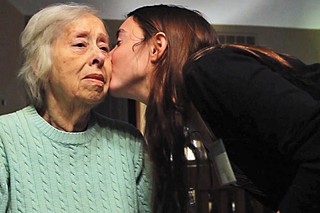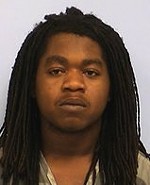Because I Could Not Stop for Death
'Beginning With the End' teaches us not to fear the reaper
By Melanie Haupt, Fri., March 7, 2014
We Americans are weird about death. It is entertainment in the form of violent video games, television, and movies. We attempt to beat it back through diet and exercise and quitting smoking once and for all (we really mean it this time!). When a celebrity dies, we stalk TMZ, hitting refresh in hopes of seeing the footage of the body bag being wheeled out of the brownstone, and then we write long thinkpieces about what we lost when the entertainer in question shuffled off this mortal coil. The reality of death is so removed from our daily experience that when a young person impulsively snaps a selfie with a cadaver while on a field trip to a medical school, it lays bare the fractured, dysfunctional way we deal with death.
There exists, however, a growing document in our culture of ways that some of us are trying to take death on its terms, authentically and stripped of the veil of entertainment and taboo. Time of Death is a recent Showtime docuseries that follows terminally ill patients in the final weeks of their lives, even up to their final breaths, surrounded by family and caregivers bearing witness to a person's most intimate moment: their exit from this world. Now there is also Beginning With the End, David Marshall's documentary focusing on high school students enrolled in an elective class that trains them as hospice volunteers. They start out by learning basic comfort care: adjusting pillows, providing water, and so on. Yet, as they settle into their roles as caregivers to the ailing, they learn the value of simply being there.
One particularly striking scene depicts one of the young women sitting at a kitchen table, doing her homework in companionable silence with a hospice resident reading the newspaper. "Some of these kids move toward the bedside to help somebody and find that their help is really valuable; they see themselves in a different light. Over time, they come to realize that their presence is really all that's needed," says Marshall. "It's obvious that this is part of who we are. If you're given a chance to be empathetic and compassionate and you're given some tools and the faith that you can do it, you can."
The film's angle, as expressed by Bob Kane, the English teacher who guides the students through the class, is that the act of reframing death empowers people to live a better life. We don't need to go to the woods to live deliberately: We just need to live our lives in each moment, with one another. "No one talks about the job they had at the end of life, or the school they went to or the car they drove, the money they made," says Marshall. "What people talk about is who they loved and who loved them. That's a valuable lesson for 17-year-olds to learn. What language do I want to use at the end to describe my life? If you can start to look at your life in those terms, you can have an extraordinary experience."
Indeed, kids today grow up focusing on having the best college applications, the best internships, the best credentials to position themselves for a bright future. What the teens in Beginning With the End experience, though, isn't so much college readiness but life readiness. Marshall agrees. "This kind of heart-centered learning is so necessary," he says. "We're in a society where so much of our engagement is not real; the process of just having a one-on-one relationship is getting harder and harder to have."
This truth bears itself out onscreen. As the movie closes, one girl tearfully reflects on her experience in hospice class. "It's scary to fall in love with a person, and then they die. But it was worth it to fall in love with those people."
Beginning With the End
Documentary Competition, World Premiere
Monday, March 10, 11am, Stateside
Tuesday, March 11, 2pm, VCC
Saturday, March 15, 11:30am, Stateside












